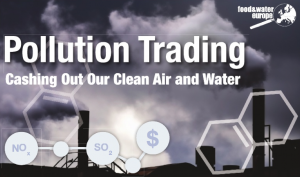The Weakest Link: Problems and Perils of Linking Carbon Markets
Using carbon markets to reduce carbon dioxide (CO2) emissions is nothing new and hardly effective. However, despite the absence of significant emissions reductions from cap-and-trade initiatives and the all-but-complete collapse of the European Union Emissions Trading System (EU ETS), supporters of carbon markets now want to begin linking markets together. This idea is backed by claims that doing so will increase economic efficiency and allow emissions reductions to happen at a lower cost, but combining many broken pieces does not make an effective whole. In reality, linking provides a way to allow pollution at the lowest cost to polluters. In January, California and Quebec officially linked their carbon markets. The reasoning behind linking argues that it will allow polluters to purchase emissions reductions credits at the lowest price — if credits cost less in Quebec, polluters in California can purchase credits on Quebec’s market, ultimately making polluting more affordable.
Using carbon markets to reduce carbon dioxide (CO2) emissions is nothing new and hardly effective. However, despite the absence of significant emissions reductions from cap-and-trade initiatives and the all-but-complete collapse of the European Union Emissions Trading System (EU ETS), supporters of carbon markets now want to begin linking markets together.
This idea is backed by claims that doing so will increase economic efficiency and allow emissions reductions to happen at a lower cost, but combining many broken pieces does not make an effective whole. In reality, linking provides a way to allow pollution at the lowest cost to polluters.
In January, California and Quebec officially linked their carbon markets. The reasoning behind linking argues that it will allow polluters to purchase emissions reductions credits at the lowest price — if credits cost less in Quebec, polluters in California can purchase credits on Quebec’s market, ultimately making polluting more affordable.
It is theorized that eventually credit prices will equalize and polluters will enjoy a market with greater liquidity, lower prices and greater price efficiency. Sounds great, if you’re a polluter. However, if this scheme seems blatantly absent of benefits to the environment or ways in which it will actually reduce emissions, that’s because it is. Linking carbon markets serves polluters and makes it even easier for them to pay-to-pollute.
Linking carbon markets actually presents risks of emissions leakage, increased emissions and increased market volatility. The ability for a polluter in California to purchase credits in Quebec also creates a situation similar to offsetting emissions, wherein reductions can happen elsewhere, but not at the source of pollution. This has the potential to create regional hotspots as reductions happen where the cost to the polluter is the lowest.
Implications for democratic processes and public participation also arise from linking carbon markets. Diminished oversight, accountability and regulation, are just some of the problems that become magnified through linking. It essentially facilitates the deregulation of carbon markets.
This is an alarming trend in light of the EU ETS’s near collapse and the prospect of future links with markets like those in China, the country with the largest share of global CO2 emissions. The burden of China’s CO2 emissions alone makes the prospect of them linking with another market a major liability. The ultimate goal of linking markets is to one-day form a global carbon market, further diminishing any oversight, accountability and democratic processes.
The only meaningful and legitimate option for addressing CO2 emissions is to stop polluting without exceptions. Cap-and-trade, carbon taxes, offsets and other pay-to-pollute schemes only delay making significant and necessary reductions. Linking carbon markets is just another substandard approach to address emissions and kicks the can further down the road.
For more information please see our latest issue brief on linking carbon markets:
U.S. version: Cashing Out
EU version: Cashing Out



